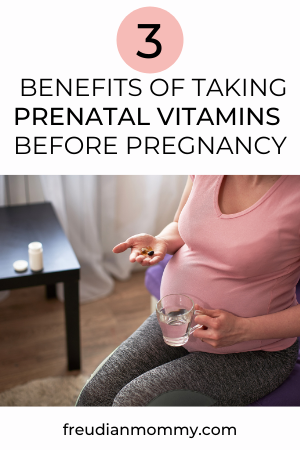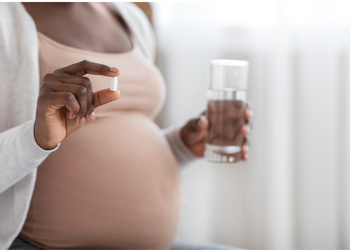Taking prenatal vitamins before trying to conceive may reduce the risk of birth defects such as spina bifida and anencephaly.
If you’re planning to become pregnant, you’re probably wondering when to start taking prenatal vitamins?
Although taking prenatal vitamins is mostly thought of once a woman becomes pregnant, experts in the medical community are communicating that taking prenatal vitamins before trying to conceive has been learned to be advantageous to both mother and baby.

No matter how nutritious of a diet you have, growing a healthy baby takes a lot of additional vitamins and minerals.
Taking a prenatal vitamin even before you are pregnant will provide those additional nutrients that will lower the risk of severe birth defects such as spina bifida and anencephaly, and improve the outcome of your pregnancy.
Related article: How to Relax While Trying to Get Pregnant
What do prenatal vitamins do?
Prenatal vitamins are designed primarily for pregnant women because when growing your baby, you need extra vitamins and minerals.
The daily recommended vitamins and minerals can be difficult to get from your daily diet alone, that’s where prenatal vitamins come in handy.
Prenatal vitamins supply your body with the additional daily recommended nutrients that it needs to help your baby grow and develop healthily.
These vitamins have three key ingredients to help a pregnant woman maintain her health as well as that of her future baby.
Folic Acid:
Folic acid also known as folate is a man-made type of B vitamin that is essential during pregnancy because it helps prevent neural tube defects. The neural tube in the fetus becomes the brain and spinal cord.
Folic acid also helps the body make new red blood cells, which carry oxygen throughout the body. This key vitamin helps your baby to grow accordingly and decreases the risks of neural tube defects such as spina bifida and anencephaly.
This very crucial vitamin may also lessen the risk of pregnancy difficulties such as preterm labor and issues with the development of the placenta.
Related articles: Overcome Morning Sickness Misery With These 8 Pregnancy Sickness Hacks!
Iron:
Iron is another vital mineral that is direly needed during pregnancy. During pregnancy, because the blood volume in a woman’s body increases, you need twice the amount of iron as you normally do.
Iron is important because it does the job of helping your body create that extra blood and hemoglobin that is needed to support your baby. Iron also helps transport blood from your lungs to the rest of your and your baby’s body through the protein, hemoglobin found in the red blood cells.
It is important to note that iron deficiency is a common struggle during pregnancy, roughly fifty percent of women don’t get enough iron during pregnancy.
Iron deficiency means that your body does not have enough functioning red blood cells to carry a sufficient amount of oxygen to the rest of your body, which can be a dangerous situation for your baby. This type of deficiency is known as iron deficiency anemia.
During pregnancy, they are a lot of risks associated with severe iron deficiency anemia. These include risks include:
- Your baby being born with a low birth weight
- Premature birth or delivery before 37 weeks of pregnancy
- Postpartum depression
- And more scarily, an increased likelihood of infant death instantly or after birth.
Not only it is recommended that you take a prenatal vital that provides the amount of iron that your body needs, but it is also encouraged that you eat foods that are rich in iron such as:
- Iron-fortified cereals
- Iron-fortified oatmeal
- Whole wheat bread
- Eggs
- Meats such as beef chicken, liver, pork, and lamb
- Oysters
- Tofu
- Beans, peas, lima beans, and lentils
- Leafy greens like spinach and kale
- Dried fruits like raisins
Calcium:
And finally, calcium. Calcium is needed for building your baby’s bones and teeth. And because your body does not produce calcium, you have to obtain calcium from calcium-rich foods or supplements.
Your body intuitively removes calcium from your bones and teeth to give to your baby. If you aren’t eating calcium-rich foods or aren’t taking a calcium supplement, you could be at risk of developing osteoporosis in the future.
Please visit the American Pregnancy Association for a list of calcium-rich foods and to know how much calcium you should be taking daily during pregnancy.
How early should you start taking prenatal vitamins?

It is when your baby’s neural tube develops into the brain and spinal cord. Birth defects also happen within the first 3-4 weeks of pregnancy.
Taking folic acid can help decrease the risk of birth defects such as anencephaly and spina bifida during this critical stage of pregnancy when your baby’s brain and spinal cord are forming.
That’s why the CDC encourages all women of reproductive age to take a certain amount of folic acid each day, whether they plan to become pregnant or not.
Per The American College of Obstetricians and Gynecologists (ACOG), it is recommended that you start taking a prenatal vitamin at least one month before pregnancy and during the first week of pregnancy when your baby is most susceptible.
3 benefits of prenatal vitamins while not pregnant
- Taking folic acid before and during pregnancy may improve the outcome of your pregnancy such as protecting your baby from miscarriage and low birth weight.
- Lessens the risk of severe birth defects such as spina bifida and anencephaly.
- Reduce the risk of pregnancy difficulties such as preterm labor and issues with the development of the placenta.
Pro mama tip: If you plan to breastfeed, speak to your doctor about continuing to take your prenatal vitamins while breastfeeding, which will help you to nurture your baby with nutrient-rich breast milk.
What do think about the concept of taking prenatal vitamins before pregnancy?














Great post Mama, I wish more new moms will stumble with this kind of blog 😀
Thank you so much! I wish more moms-to-be knew how important it is to start taking prenatal vitamins before pregnancy as well.